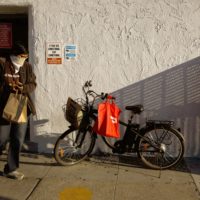
Image Source: New York Times
Every week we track the business, tech and investment trends in CPG, retail, restaurants, agriculture, cooking and health, so you don’t have to. Here are some of this week’s top headlines.
Sustainable Bioproducts has announced a new round of funding and name change. Now known as Nature’s Fynd, the company is ramping up its production of cultured meat and dairy with an $80 million infusion.
The COVID-19 pandemic has put more than 10 million independent restaurant workers at risk of losing their jobs for good. Across sectors, businesses are being forced to pivot their business models as consumers go on lockdown and change their buying habits. This round-up features many of the ways the pandemic is impacting all parts of the food industry.
In an effort to do our part and support the community we love so dearly, we have compiled a list of resources and organizations that are providing support to those in need. We are also offering free job postings to anyone who is looking to employ people impacted by the COVID-19 pandemic.
- Call Your Reps to Save Independent Restaurants: We need to keep calling our reps to urge the House to pass the $2 trillion stimulus package and get independent restaurants some relief. Here is a sample script.
- Resources: Please add any resources, organizations, initiatives, virtual gatherings, etc. here, so we can promote them.
- Jobs: Use code “coronavirusfoodjobs” to post remote or remote-friendly food jobs on our job board.
We need your support as well. Producing our newsletter takes a lot of time and resources, and we need to change our business model to keep it going. To date, we’ve funded our work through our events, sponsorships and consulting, which are all on hold due to the pandemic. If you find our newsletter to be a valuable resource, we hope you will consider making a one time or monthly contribution, so we can keep the newsletter going and free for those who can not afford a subscription fee. Not able to contribute right now? You can help by sharing our newsletter with friends and colleagues.
Check out our weekly round-up of last week’s top food startup, tech and innovation news below or peruse the full newsletter here.
1. Chicago Startup Raises $80M to Make Chicken Nuggets in a Lab – AmericanInno
Sustainable Bioproducts, now known as Nature’s Fynd, has raised a new round of funding led by Generation Investment Management and Breakthrough Energy Ventures. Funding will be used to support production at its new facility.
2. Coronavirus Sparks Hiring Spree for Nearly 500,000 Jobs at Biggest Retailers – Wall Street Journal
Walmart, Amazon and CVS are among about a dozen large companies looking to hire nearly 500,000 Americans in coming weeks, a spree that would mark a major shift of the US workforce from smaller businesses that have cut staff to survive the coronavirus.
3. Will We Have an America Without Restaurants? – New York Times
Independent restaurants employ more than 10 million people. Our fear is that these jobs may well disappear for good. In New York alone, nearly all 26,000 restaurants have now shut down.
4. How You Can Help Save Restaurants – James Beard Foundation
Seven million people have been laid off and chefs and restaurant owners have become fluent in the ins and outs of disaster relief and applications for emergency aid. There are things that each and every one of us can do, whether you’re a diner or industry professional.
5. Webinar Recap: Optimizing E-Commerce During the COVID-19 Crisis – Nosh
The global lockdown has made e-commerce more vital than ever in sustaining sales during an uncertain economic period. VMG Partners and Right Side Up hosted a webinar to help companies swiftly optimize their businesses.
6. India: BigBasket Acquires Online Milk Delivery App DailyNinja – Bloomberg
The merger comes at a time demand for online groceries has skyrocketed due to a coronavirus-triggered lockdown in India. Financial terms were not disclosed.
7. By the Numbers: COVID-19’s Devastating Effect on the Restaurant Industry – Eater
From canceled dinner plans to delivery app downloads, app data reveals how COVID-19 has brutalized restaurants.
8. Restaurants Closed By Coronavirus Won’t Reopen Without Economic Assistance – The Washington Post
Without grant money, loan forgiveness and help from insurance companies, independent restaurants may not reopen after quarantines end.
9. Inside the Story of How H-E-B Planned for the Pandemic – TexasMonthly
The grocer started communicating with Chinese counterparts in January and was running tabletop simulations a few weeks later.
10. To Save Their Industry, Restaurant Owners Get Organized – Grubstreet
The most effective, fast-moving action is a three-tiered approach: the Independent Restaurant Coalition, the Relief Opportunities for All Restaurants, and the New York City Hospitality Alliance.
11. Chinese Tech Giant Pumps $85M Into Farm Produce Platform – AgFunder
Meituan Dianping led the round. Wangjiahuan is a B2B portal for agricultural produce, providing a range of services from group buying and selling to marketing.
12. If Coronavirus Doesn’t Get Us, Starvation Will’: A Growing Number of Americans Say They Can’t Afford to Stock Up on Groceries – The Washington Post
For those living on a fixed income, it can be difficult to stock up on groceries for weeks at a time, especially when many shoppers are panic-buying because of fears about the coronavirus pandemic.
13. Countries Starting to Hoard Food, Threatening Global Trade – Bloomberg
It’s not just grocery shoppers who are hoarding pantry staples. Some governments are moving to secure domestic food supplies during the coronavirus pandemic.
14. Facing Labor Shortage, Feds Encourage Farmers to Hire Foreign Workers Already in the US – The Counter
Producers worry that workforce gaps now will lead to food supply issues during harvest season.
Our newsletter is the absolute easiest way to stay on top of the emerging sector, so sign up for it today and never miss the latest food tech and innovation news and trends, Already signed up? Share the love with your friends and colleagues!





